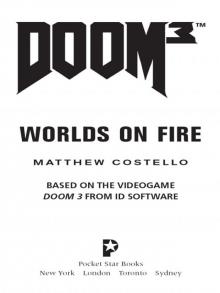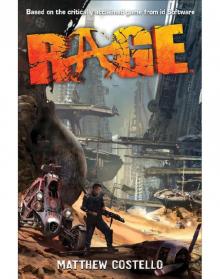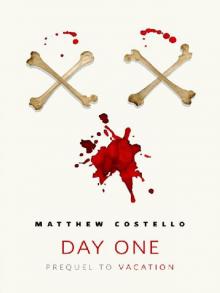- Home
- Matthew Costello
Beneath Still Waters Page 11
Beneath Still Waters Read online
Page 11
mentary school—eighth grade, 1939. A teacher stood
at attention beside thirty or more of her charges, all look-
ing uncomfortable, the girls in spanking clean dresses and
the boys in their Sunday white shirts.
One boy’s face was circled.
A short fellow with bright eyes that looked right at the
camera.
“Billy Leeper,” Winston said, almost gently. “He was
there that day. With Jackie. He saw what happened.”
Winston touched the boy’s picture, as if reaching across
the decades. “He was there and he got out.” Winston looked
at Dan. “If anyone knows what happened to Jackie Weeks
and the town of Gouldens Falls, it’s Billy Leeper.”
E I G H T
“Not a minute too soon,” Dan said, sliding up next to Susan.
“Oh. I thought you were going to miss the show.”
He looked around at this circus, this carnival of thrill
seekers gathered around the lake. “The old reverend was a
tad more interesting than you might imagine.”
“Step back, folks . . . behind that barrier.”
Some well-padded fellow, wearing an Ellerton Volun-
teer Firemen windbreaker and clutching a heavy-duty
walkie-talkie, was gesturing at them to step back.
“Back a bit more,” he barked, eyeballing Dan.
“We can’t stay all the way back there,” he said quietly,
leaning close to Susan. “Let’s see if we can get closer.”
The southeast corner of the dam was flooded with spot-
lights, giant klieg lights that gave every slack-jawed busy-
body standing within their glare that illusion that they were
part of the action.
Everyone loves a crisis, Dan thought.
“I don’t think we can—” Susan started to say.
But he grabbed Susan’s arm and guided her past the
b e n e a t h s t i l l w a t e r s
99
barrier. “Just walk like you know what we are doing and
direct me toward the police chief.”
Susan shook her head. “You’re crazy, Dan. But he’s
over there. His name’s Paddy Rogers. A tough Irishman.
Over—”
“I see him.”
The chief was standing near the edge of the water. There
was a beached boat beside him, filled—almost dangerously,
it seemed—with electronic equipment.
Damn, this could be perfect. If he could just go with
them now.
“Introduce me,” he said. “Build me up.”
He dug into his pocket for his business card and found
one, which turned out to be a bit too dog-eared to use to
make an impression. He steered Susan right next to the
burly chief.
Rogers turned around and stared at both of them.
“Susan? What are you doing here? I told my boys to—”
Dan could sense the bum’s rush coming, and leaped
into the fray. “Chief Rogers, I’m Dan Elliot.” He grabbed
Rogers’s hand and gave it an unwanted shake.
“He’s a writer for—”
“Lots of places. The L.A. Examiner, Time, Playboy . . .
you name it.”
“Well, I’m sorry, Mr. Elliot, you’ll have to move back over
three with everyone else,” he said, gesturing. “Behind—”
One of the divers came up to the boat, threw his flippers
in, and turned to the chief and said, “We’re all set to go.”
“Fine,” Rogers said, turning away from Dan. “Just give—”
Dan quickly checked the diving team’s equipment.
This was no Sunday diver gear here, no AMF flippers and
toy snorkels. The wet suits were German-made—the best
available—with an extra thermal layer. Real toasty. And
the regulators, like the oversize tanks, were state of the
art.
100
m a t t h e w j . c o s t e l l o
But the sonar gear could put a small sub to shame. It
filled about half of what was a flat-bottom New York police
boat. A large chunk of the floor space was taken up by a
two-way radio.
They’d be able to talk with the divers between gulps of
oxygen.
He had to be there. By tomorrow the whole reservoir
might be out of bounds.
“I’d like to go,” Dan said, touching Rogers on his shoul-
der. “I’m a diver, registered and all. I could help—”
“Out of the question, sir,” Rogers snapped. “Susan,
would you please escort your friend back—”
One of the divers, not more than twenty years old, came
up to Dan. “Where have you dived?”
“Name it,” he said. “Everywhere from Cancun to a
nasty frozen lake outside of Yellow Knife, Canada. I also
did a piece on skin diving in the Amazon River.”
The cop grinned. “Oh, yeah . . . I read that. Great stuff.
Made me glad that all I had to deal with was the East
River.”
“I hyped it a bit for the reader, you know, about the pira-
nha and all. But—”
“C’mon,” Rogers said, taking him by the arm. “That’s
enough. These fellows have work to do—”
The city cop interrupted. “Chief, if you don’t mind, we
might be able to use him—topside, that is. It could help to
have another diver there . . . in case there’s a problem. It
would free Jack up to check the sonar.”
Dan grinned, but Rogers still held his arm.
So close, he thought.
“I don’t know . . .”
The other diver, somewhat older, called for his partner
from the front of the boat. “All set. Let’s get moving.” He
started the throaty inboard engine.
The crowd’s chattering faded, and the boat’s engine
sputtered to life in the shallow water. The radioman climbed
b e n e a t h s t i l l w a t e r s
101
in, and a puff of smoke was suspended over the crowd’s
heads.
C’mon, man, Dan thought.
Rogers looked right at Dan. “Okay.” He looked at the
divers. “This is your show. But no pictures, Mr. Elliot. Not
tonight. Not until we know what happened here.”
“I’ll leave my camera right here,” Dan said, smiling, un-
slinging it and handing it to Susan.
He again pumped the chief ’s unenthusiastic hand.
“Thanks.” He jumped into the boat, eager for them to
pull away from the shore, before the stubby police chief
changed his mind.
The plane touched down rockily, rudely slapping the run-
way at JFK. People clapped. Others began to cry, tears of
relieved happiness. Most sat in numb silence.
Karen listened to the head attendant calmly tell the pas-
sengers to please wait until the plane had taxied up to the
tentaclelike exit ramp. But they ignored her, popping off
their seat belts, scrambling to pull down their too bulky
carry-on luggage.
Standing. Waiting.
Oh so eager to get off the plane.
Each and every one standing behind Martin Parks (who,
she saw, carried only the slimmest of attachés).
The plane rolled to the ramp, taking, it seemed, so much
time, crawling up the ramp. Outside, the air was fill
ed with
the sound of planes roaring into the sky like clockwork.
And still their plane rolled, creeping up to the American
Airlines terminal. Then it stopped. The captain (and she
wondered what kind of shape he was in) flipped off the
seat-belt light.
The main exit door opened.
And Parks looked back at her.
Smiled at her.
102
m a t t h e w j . c o s t e l l o
And held it for just a moment. A horrible moment.
Then she slowly slid into a vacant seat. Her skin was
cold. She brushed feathery wisps of hair away from her
face, her cheek, wisps that weren’t there.
Her stomach spasmed and she began coughing, then
vomited. Over and over, as if trying to scrape some horrible
poison out of her insides.
The passengers ignored her.
They just wanted out.
But all Karen could think about (again and again, like
some terrible, nagging dread that just wouldn’t go away)
was . . .
Who was Martin Parks?
And, God help them, where was he going?
The New York cops made Dan feel totally welcome.
The two divers, he learned, were Tom Flaherty and Ed
Raskin, veterans of four and eight years respectively. The
dour sonar man was Jack Russo.
“Nice of you to invite me,” he said.
“I liked your article,” Tom said, smiling. “Besides, Jack,
here, can get a bit fussy watching all his dials. Tends to for-
get about us bobbing around down below.”
“I do not.”
“Easy, just kidding, Jacko.”
The other cop—who didn’t seem as lighthearted—was
beginning to put on his tank and weights. “Let’s get started,
Tommyrot. It’s body-bag time.”
“Ed’s been having a bit of a time eating after work.” Tom
grinned. “Too many gooey bodies have put him off his . . .
what’s your favorite dish, Ed?”
“Linguine with clam sauce. And dry Chianti.”
After cruising out into the lake for a few minutes, Russo
put the boat in neutral. He then hit a button and an anchor
slid noisily into the water. Tom turned on the radio. “Dan,
b e n e a t h s t i l l w a t e r s
103
it’s as simple as pie. Just press here to talk, otherwise leave
the line open. Jack, here, tends to chatter a bit much, so it’ll
be a pleasure to—”
“Be careful right under us,” Russo said. He was scan-
ning the sonar screen. “There’s something pretty large
about thirty feet down. A building, most likely. There’s a
good-sized drop-off about twenty feet to each side.”
All this easy banter . . . graveyard chatter, Dan thought.
Helps to keep the willies away, probably. “Why start here?”
he asked.
“In river work you go back and forth,” Tom explained.
“Assuming, of course, that what you’re looking for hasn’t
been carried out to the ocean. But a lake’s different.”
“We’ll work in semicircles,” Ed said. “In the center of
that circle is—”
Dan could figure that one out. The spot where Tom Fluhr
vanished.
“Right,” Tom said.
He watched them finish suiting up. All in black except
for the shiny tubes leading to their tanks.
Oh, the pictures he could have gotten! But being here
was better than being on shore (with every beered-up geek
from miles around). And if the body turned up, and if it
was a simple case of drowning, he’d be home free.
They’d probably love the publicity. Love for him to take
pictures of the Town that Drowned.
Sure they would.
If they find the body.
Yeah, and if it turned out that Tom Fluhr had, indeed,
just drowned.
Claire always knew it was a dream.
That wasn’t the scary part. There was no way she’d be
tricked into thinking it was like real or something. It was
just a dream.
104
m a t t h e w j . c o s t e l l o
She knew that.
A dream.
The same dream all the time.
But that didn’t help her. It almost didn’t matter. It was
like being forced to sit through the same yucky movie, night
after night, knowing when all the bad scenes were going to
come.
And it always started with her swimming.
It was some kind of beach, she guessed, though she never
recognized it. Or any of the dumb-looking people standing
knee-deep in the water (so cold!) with their brats flopping
around, screaming, “Look at me, Mom, look at me, Dad!”
She’d walk past them. Past the happy families, feeling
the icy water climb up her legs, covering her tummy, dar-
ing her to take the plunge.
Which, after one long look at the blue sky and the puffy
little lamb clouds, she did.
She loved it under water. Kicking seallike, harder and
harder, as if it were the most important thing in the world,
to just keep moving, farther and farther, until she surfaced.
And then she saw that the sky had changed into a dark,
dull gray. (“Lightning weather,” her mother always said.
“Better come out now, honey.”)
She turned. (Knowing it was a dream. Just a dream.)
And everybody was gone. No moms, no dads, no brats, no
beach towels, nothing.
Just little Claire going for a swim. All by herself.
So she’d leave the water. Staying on the surface now (the
better to see the lightning come, she’d think, kicking and
stroking while her eyes kept searching the clouds for the
first nasty yellow streak).
Then she’d see them. Coming onto the beach. The people.
Who weren’t people. People don’t walk that way, she
told herself. (In this just-a-dream.) No, people don’t stum-
ble around like wounded animals, growling, looking as if
they’d like to bite someone.
b e n e a t h s t i l l w a t e r s
105
She always felt that there was a place that she could stop
the dream. Some magical point at which she could say,
“Okay, that’s enough, let’s wake up now. Maybe pee. Get a
slug of apple juice.”
It was too late. Now. Maybe always.
Suddenly she knew she’d have to get away from them,
and she turned around.
(Horrible moment. It was the one picture that could
make her go all cold and sick the next day, even when she
was reading in bright sunshine surrounded by hundreds of
kids.)
Dozens more of them—these grayish “not-people”—
were behind her, coming from the lake, right toward her.
Led by—
(And, of course, she knew this was coming. Knew it. It
always came.)
Her mother. Reaching out for her, her gray and slimy
face still just recognizable. She opens her mouth.
(“Don’t talk,” Claire wants to beg this mom-thing.
“Don’t—”)
Something slithers out of her mouth, lizardlike, leaping
from between the brown, rotted
teeth, plopping down to the
water.
And if she’s lucky, really lucky, her real mother hears
her screaming out loud, hears her cries, and comes in and
shakes her harder and harder to end the dream for this
night.
But the real mom doesn’t come. Not tonight. Only this
dream thing, which comes closer, resting an oily hand on her.
And pulls her down, into the water, down with all the
other not-people. Down where lizards crawl into open
mouths (and no one minds!). Down.
But she never gets there. She awakens. Crying, moaning
into her pillow, her fist tight, bunching up the sheet, trying
to pull away.
Awake. Screaming. But awake. In minutes she stops.
106
m a t t h e w j . c o s t e l l o
A regulator clock ticks off seconds in the hallway. A car
passes. In a few moments, when her breathing slows, she
hears the loud hum of the refrigerator.
Her bed is wet again. An accident. At eleven years old!
But she doesn’t cry.
She just wonders when she’ll stop having this same
dream.
Over and over and over. She gets up and wedges her
chair against the door.
He stared at them. With envy, with a crazy kind of itchiness
that only another diver would understand.
“Can you hear okay . . . through the headphones, I
mean?” Tom asked.
“Clear as a bell. If they work that well under water,
then—”
“They do,” Russo said, turning to Dan. “Just don’t blast
their eardrums by getting too close to that microphone.”
Their masks nearly covered their whole head. Their
mouths were completely free to talk, and the regulator—
which automatically kept a supply of fresh air pumping
in—was just below the chin.
It was great stuff—the ultimate diving technology.
He had used a radio once. Just once. In Lake George. In
the middle of the winter.
To use it, the diver had to talk like Cloris Leachman in
Mel Brooks’s movie High Anxiety. She managed to speak
through the whole movie with clenched teeth (telling a
feverish Harvey Korman, “I’ll let you wear my under-
wear.”) Took practice, that’s all. It was a freakin’ night dive
too. Night, ice, and a goddamn body hunt.
Only that time the body was about six years old.
Jesus. He remembered downing a few shots of Jack
Daniel’s before going out. Had to keep the old blood
b e n e a t h s t i l l w a t e r s
107
circulating. Wet suit or no, he knew the icy water would

 Cherringham--Too Many Lies
Cherringham--Too Many Lies Mydworth Mysteries - A Shot in the Dark (A Cosy Historical Mystery Series Book 1)
Mydworth Mysteries - A Shot in the Dark (A Cosy Historical Mystery Series Book 1) Cherringham--The Gentleman Vanishes
Cherringham--The Gentleman Vanishes Cherringham--Cliffhanger
Cherringham--Cliffhanger Beneath Still Waters
Beneath Still Waters Cherringham--Trail of Lies
Cherringham--Trail of Lies The Gentleman Vanishes
The Gentleman Vanishes Mydworth Mysteries--Murder wore a Mask
Mydworth Mysteries--Murder wore a Mask Mydworth Mysteries--London Calling!
Mydworth Mysteries--London Calling! Cherringham--Killing Time
Cherringham--Killing Time Mydworth Mysteries--The Wrong Man
Mydworth Mysteries--The Wrong Man Cherringham - The Drowned Man
Cherringham - The Drowned Man Cherringham--Killer Track
Cherringham--Killer Track Cherringham--The Secret of Brimley Manor
Cherringham--The Secret of Brimley Manor A Deadly Confession
A Deadly Confession Cherringham--Murder under the Sun
Cherringham--Murder under the Sun Cherringham - A Dinner to Die For
Cherringham - A Dinner to Die For Family
Family Cherringham--Death Trap
Cherringham--Death Trap Cherringham--The Curse of Mabb's Farm
Cherringham--The Curse of Mabb's Farm Vacation
Vacation Cherringham--A Bad Lie
Cherringham--A Bad Lie Doom 3™: Worlds on Fire
Doom 3™: Worlds on Fire Cherringham--Scared to Death
Cherringham--Scared to Death Home
Home Dead in the Water
Dead in the Water Star Road
Star Road Rage
Rage Cherringham--A Fatal Fall
Cherringham--A Fatal Fall Jack Murphy_Prequel_Day One
Jack Murphy_Prequel_Day One Doom 3™: Maelstrom
Doom 3™: Maelstrom